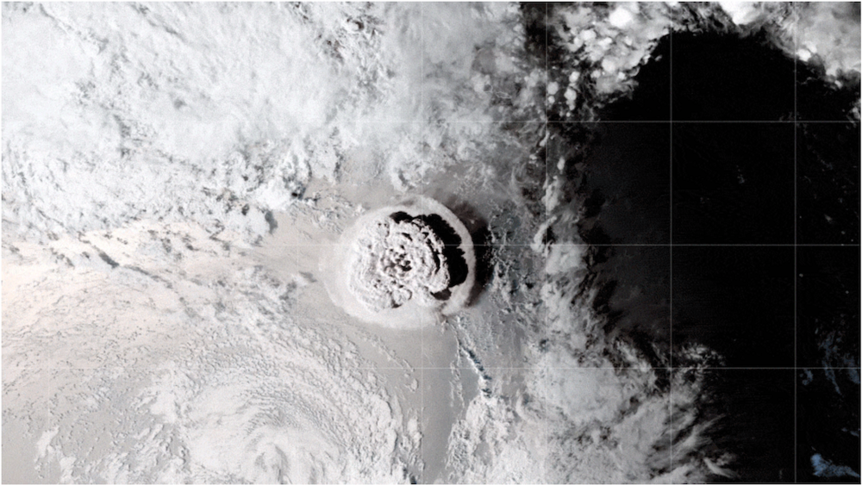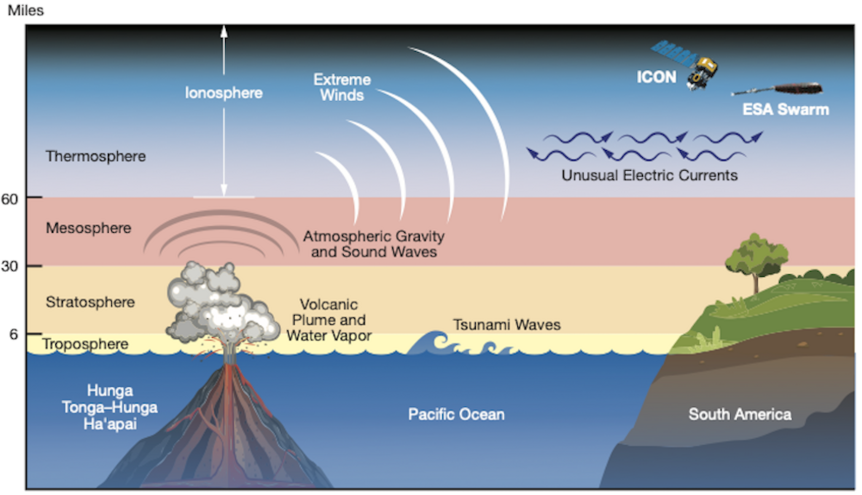Create a free profile to get unlimited access to exclusive videos, sweepstakes, and more!
The 2022 Tonga Volcanic Eruption May Cause Temporary Global Warming
The eruption caused temporary warming over the Pacific, and could increase global warming over the next decade.

In Roland Emmerich’s 2012 (streaming now on Peacock!) the world runs head on into a catastrophic apocalypse, complete with earthquakes, tsunamis, and volcanoes. In the real world, we survived the predicted end of the world in 2012, but we’re still experiencing the slow apocalypse of anthropogenic climate change. And it too has a close relationship with natural disasters.
According to a recent study published in the journal Nature Climate Change, the January 2022 eruption of Hunga Tonga-Hunga Ha’apai caused temporary warming over the Pacific and could push us over the 1.5 degree Celsius threshold set by the United Nations.
Hunga Tonga-Hunga Ha’apai’s Unexpected Warming Effect
While volcanoes bring fire and chaos during their eruption, they usually have a cooling effect on the overall climate. That’s because eruptions release a whole bunch of sulfur into the air, which makes its way high into the atmosphere where it settles down in the form of tiny reflective particles. A sufficiently violent eruption could block enough sunlight to drop the average global temperature by a few degrees Celsius for a few years or more. Which is why it’s so weird that Hunga Tonga-Hunga Ha’apai appears to have caused a warming effect over the Pacific.
RELATED: Volcanic Eruption Was So Extreme, It Reached Space
The eruption began in December 2021 but peaked in January 2022 when the volcano dumped thousands of tons of material into the surrounding air. The volcano is located about 65 miles north of Tongatapu, Tonga’s main island, submerged about 150 meters beneath the ocean surface. When it erupted, it released the normal volcanic mix, but it also carried an incredible amount of water (in the form of vapor) with it. The resulting cloud produced the most impressive lightning storm in recorded history and it raised the probability of global surface temperature rise over the next decade.
When the volcano popped off, it sent an estimated 146 metric megatons of water into the stratosphere, several miles above the planet’s surface. That water vapor acts as a greenhouse gas, trapping heat and raising the average temperature over the Pacific. That warming is temporary, but it’s an added pressure on an already strained system.
RELATED: Up to a Million Skate Eggs Found at Volcanic Underwater Nursery
The United Nations’ Paris Agreement set a threshold of 1.5 degrees Celsius over the pre-industrial average. That’s the horizon we’re trying not to cross, but it’s looking increasingly likely that we might. Importantly, crossing 1.5 C isn’t a “point of no return” but every fraction of a degree of warming we avoid is a good thing.
In May 2022, the World Meteorological Organization predicted a 50-50 chance that we would crest 1.5 C of warming in the following five years. Taking the Hunga Tonga-Hunga Ha’apai eruption into account, the new study predicts an additional 7% probability, tipping the scales in favor of excessive warming. Of course, we can’t control volcanic eruptions, but we can do something about our own contributions to global climate change before what buffer we have remaining runs out.
See the end of the world the way it was intended, on screen. 2012 is streaming now on Peacock!




























